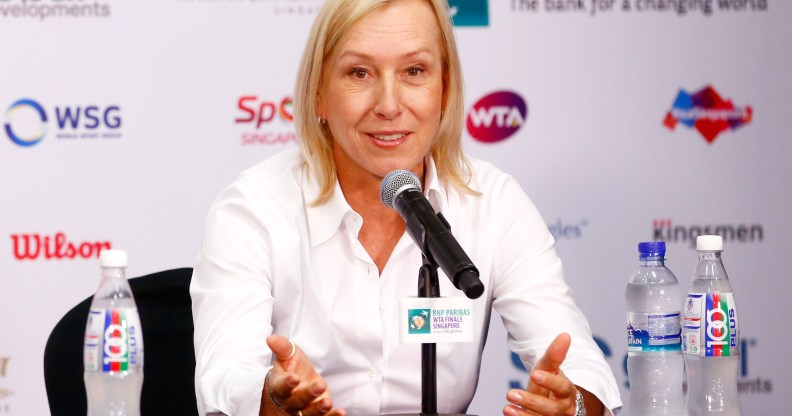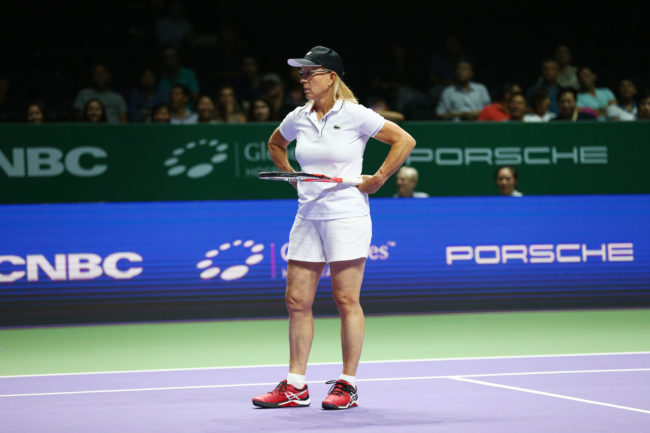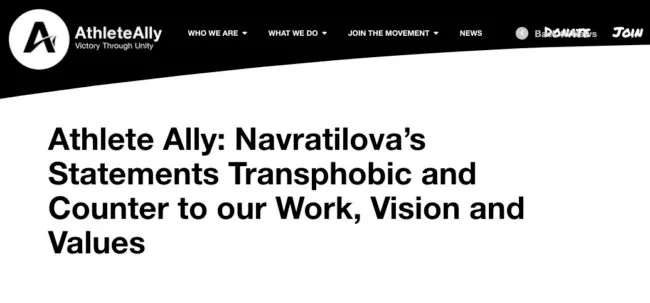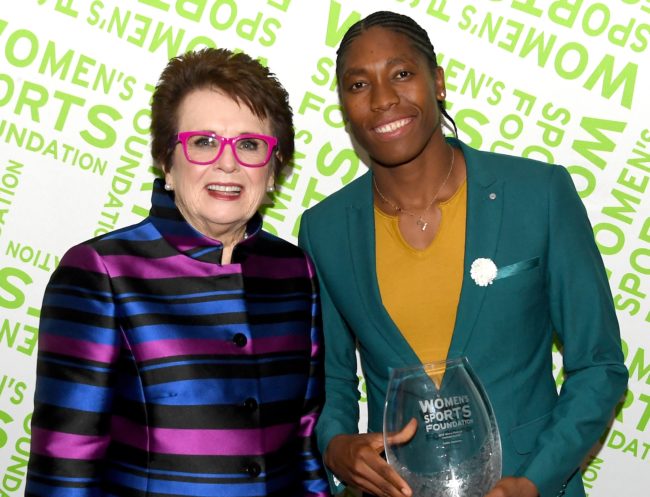Athlete Ally cuts ties with Martina Navratilova over ‘transphobic’ comments

LGBT group Athlete Ally cuts ties with tennis legends and lesbian icon Martina Navratilova condemning her “transphobic” comments. (Julian Finney/Getty)
LGBT+ group Athlete Ally have cut ties with tennis legend and lesbian icon Martina Navratilova after she wrote a column in The Sunday Times objecting to the inclusion of trans athletes in sports.
In a statement published on their website on Tuesday (February 19), Athlete Ally condemned Navratilova’s comments as “transphobic” and based on “a false understanding of science and data” that promotes “hateful stereotypes” and goes against the LGBT+ group’s mission of fighting homophobia and transphobia.
“Martina Navratilova’s recent comments on trans athletes are transphobic, based on a false understanding of science and data, and perpetuate dangerous myths that lead to the ongoing targeting of trans people through discriminatory laws, hateful stereotypes and disproportionate violence,” the statement read.
It added: “Given this, Navratilova has been removed from our Advisory Board and as an Athlete Ally Ambassador, effective immediately.”

Tennis legend Martina Navratilova has previously championed gay rights. (Clive Brunskill/Getty)
Navratilova, a retired Czech-American player who married her longterm partner Julia Lemigova in 2014, has championed gay rights, calling out her fellow tennis legend Margaret Court’s opposition to same-sex marriage in Australia.
But in the Sunday Times piece, the openly lesbian player said having trans women competing against cisgender women would be a form of “cheating” and “unfair.”
Athlete Ally disputes Martina Navratilova
Athlete Ally rejected her comments, pointing out that “there is no evidence at all that the average trans woman is any bigger, stronger, or faster than the average cisgender woman, but there is evidence that often when athletes lower testosterone through hormone replacement therapy, performance goes down.”
The LGBT+ group has also disclosed it first contacted Navratilova over her stance on transgender rights in December, when she first advocated for “standards” regarding trans women’s ability to compete against cisgender women after she was tagged in a Twitter thread on the topic started by the group Fair Play for Women, which campaigns against transgender rights.
“Clearly that can’t be right. You can’t just proclaim yourself a female and be able to compete against women. There must be some standards, and having a penis and competing as a woman would not fit that standard,” Navratilova wrote in a since-deleted message, quoted in The Telegraph.
“We believe that growth is possible, and we extend once again to Martina the invitation to learn from this experience.”
— Athlete Ally
During a Twitter exchange involving Rachel McKinnon, the first trans woman to win a world championship in cycling, following her initial tweets, Navratilova then wrote: “I am sorry if I said anything anywhere near transphobic- certainly I meant no harm – I will educate myself better on this issue but meantime I will be quiet about it. Thank you.”
According to Athlete Ally, the group offered the tennis player to be a resource for that education but they never heard back from her.
“We believe that growth is possible, and we extend once again to Martina the invitation to learn from this experience, to study the data on trans athletes in sport, and to examine how statements like hers further stigma and discrimination,” Athlete Ally said in the statement.

Athlete Ally condemned Martina Navratilova for her ‘transphobic’ comments.
The group added: “The LGBTQ community is not a monolith. We must always leave space to learn from one another, and to grow. If we fail to do so, we are not only failing our goal to advance LGBTQ equality as a whole, but failing to live up to the core of our potential as human beings who believe all of us deserve a place in sports and in this world.”
In a separate statement, the group announced the publication of a model policy aimed at including transgender and non-binary athletes. The policy was adapted from Lewis & Clark College Athletics and developed by Athlete Ally and Out in Athletics, based on National Collegiate Athletic Association (NCAA) guidelines.
What are the current rules about transgender athletes?
In 2004, the Olympics began allowing openly transgender athletes to compete in the category matching their gender identity if they had undergone gender confirmation surgery and had been on hormone therapy for at least two years.
These rules changed in 2015—the gender confirmation surgery requirement was dropped and the timeframe for hormone therapy was reduced to one year.
Last year, the International Association of Athletics Federations (IAAF) proposed new restrictions on the testosterone levels of female athletes in running events. The rules would require athletes with particularly high levels of testosterone to compete in the male category or undertake hormone therapy to lower their testosterone levels.

Martina Navratilova retweeted a statement from Billie Jean King (L) in support of Caster Semenya (R). (Nicholas Hunt/Getty)
South African runner Caster Semenya, who has naturally high levels of testosterone due to hyperandrogenism, has mounted a court challenge against the new rules, delaying its implementation until a verdict is reached.
The verdict in the case is expected on March 26.
Semenya, who is a lesbian and married to fellow runner Violet Ledile Raseboya, has already won the backing of other sporting legends, such as openly lesbian player Billie Jean King.
“My friend Caster Semenya is unequivocally female. Forcing women w/naturally high testosterone to give up ownership of their bodies & take drugs to compete in sport is barbaric, dangerous, and discriminatory. I stand behind her and hope she prevails,” King tweeted on Tuesday.
The tennis champion has not publicly commented on Navratilova’s comments. Navratilova has, however, retweeted King’s post about Semenya.

